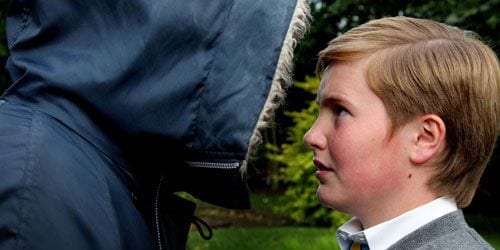
Lost in East Nowhere, Michigan, Jimmy (Ron Eldard) is wailing into his cell phone, trying to find somebody, anybody, who will take him on. The band he’s roadied for since the 1980s, Blue Oyster Cult, has just dumped him from the tour for reasons that aren’t quite explained. Now this creature of the backstage doesn’t know what to do with himself. “I’m willing to cut my rate,” he pleads, “I just gotta be on the road.” Jimmy eventually finds himself on the next Greyhound back to New York, and then in a cab out to his mother’s house in Queens. There he finds that everything he tried so hard to escape is still there, waiting for him.
Michael Cuesta’s Roadie wants terribly badly to be a provoking study of this never-blooming perpetual adolescent. Typical of this kind of lo-fi character study, Jimmy is soon sucked back in to old patterns. A guitar riffs moodily over the many shots of him wearing heavy black leather jacket and pseudo-biker sunglasses, cigarette plugged defensively into mouth, as he wanders about the old neighborhood.
Roadie is unable to generate much interest in Jimmy or his predicament. The script (co-written by the director and his brother, Gerald Cuesta) manages some minimal fish-out-of-water humor about Jimmy’s general cluelessness. It also crafts a winningly off-kilter relationship between Jimmy and his widowed mother (a wily Lois Smith), who drifts in and out of a mental fog that leaves her half-delighted to see her son home and half-infuriated by his failure. Jimmy’s own accounting of his life sounds vaguely glamorous: he says he’s the Blue Oyster Cult’s manager, as well as writer and producer. Eliding the fact that he was just dumped on the side of the road, he tells people that he’ll be heading off to South America with the band soon. Everyone but the audience seems to take him at his word.
Eldard has a shambling charisma, but Roadie becomes a one-note comedy whose darker undertones are never fully explored. It falls to an electric Bobby Cannavale, playing an old friend/tormentor of Jimmy’s named Randy, to wake the film up. Randy’s married to Jimmy’s high school girlfriend, Nikki (Jill Hennessy). Since Jimmy still has a thing for her and Nikki is an aspiring singer-songwriter not above using his feelings to convince him to pass her demo on, a mild love triangle subplot — as well as a hotel-room coke and booze binge — adds an initially interesting wrinkle to the otherwise mild goings-on. Despite the actors’ best efforts, though, Roadie runs out of gas, leaving us none the wiser about how the road might have satisfied this unformed man-child.
Roadie
Far from the neatly landscaped neighborhoods of Forest Hills, Queens, Neds tracks the ebb and flow of adolescents in the streets of 1970s Glasgow. Buzz-cut youths with cuffed-jeans and Doc Martens battle like immigrant mobs of early New York with kitchen knives and crow bars, bellowing the names of their respective crews. At the center of one cutthroat melee is John McGill (Conor McCarron), a soft-faced teenager who not long before was a bookish lad terrorized by toughs and teachers alike. Now he beats them bloody for little reason, his once-formidable intellect long forgotten.
In this percussive drama (named for the shorthand for “Non-Educated Delinquents”), Peter Mullan lays down a ladder of descent for his protagonist, whose trajectory is all the harder to watch for how nonsensical it is. Establishing scenes show a younger John as nearly mute, turtling up for protection against his abusive father and a local bully. With a nonexistent family life in a bleak little rowhouse and no friends to speak of, John learns to rely on his own smarts. This leads him to bristle when teachers assign him to classes he thinks are beneath him, a precursor to his later violent outbursts. When his older brother Benny (Joe Szula), a legendarily mad hood, pops back on the scene just long enough to pummel John’s bully into submission (a gothic nighttime scene that John watches silently from his bedroom window), the road ahead seems clear.
Though this sort of journey is not exactly new territory, Mullan gives it all a fresh edge and, unusually, holds young John accountable. Although many factors push John into his pain and psychosis, the film makes clear that any number of his friends had upbringings just as rotten, if not worse, and without his mental gifts. When John takes revenge in one especially horrifying scene, there’s little sense that he’s reacting solely to his environment.
Neds echoes other classics of roiling childhood violence. If it doesn’t have Expressionistic look of Francis Ford Coppola’s Rumble Fish, instead offering a grittier palette of dark, wooded cemeteries and bleak concrete housing blocks, Benny evokes Motorcycle Boy. As well, John’s quick decline into near-madness is noted by adults but never arrested, a point that calls to mind Neil Jordan’s nightmarish The Butcher Boy. If Neds‘ use of clownish, surreal elements are clumsy distractions, as is its reliance on pop music cues, its dark center is very effective indeed. John’s deadened eyes only light up when everything goes inexorably wrong.

![Call for Papers: All Things Reconsidered [MUSIC] May-August 2024](https://www.popmatters.com/wp-content/uploads/2024/04/all-things-reconsidered-call-music-may-2024-720x380.jpg)



